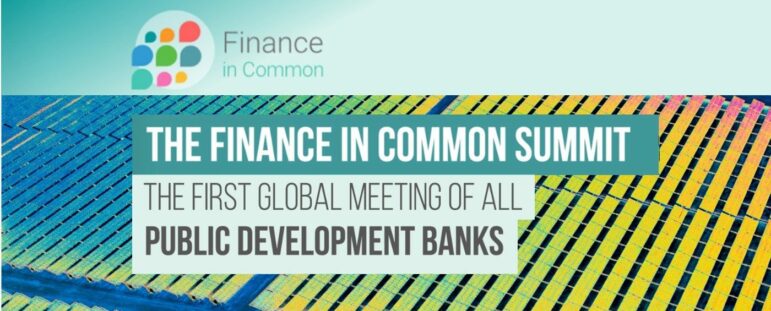
Banks Gather for Finance in Common Summit on Sustainability Solutions – Will it Matter?
This week 450 public development banks (PDBs) are gathering at the Finance in Common Summit, a seminal moment in the world of banking. The banks in attendance represent nearly $2.5 trillion in annual investments ranging from local banks and projects to multilateral banks providing development assistance across the globe. The mandate is simple: reorient the financial world towards a sustainable path.
It’s a heavy task to say the least. The era of capitalism and now neoliberal capitalism has made the unadulterated pursuit of profit sacrosanct and there are no better acolytes than those in the fossil fuel industries. Oil, gas, and coal have generated a degree of wealth and excess that has no corollary in history and has little chance of being matched in the future. It is made possible by once robust but now rapidly depleting gas and oil reserves, and a mechanistic and bureaucratic economy the facilitates its lopsidedness. The movers of loans and investments insist on control by a small number of experts who, in their diligence, require private control over the complexities of extraction, refinement, and shipment, but also the adjacent utilities such as water and electricity to insure that industry is done properly. These experts, of course, are not locals and the economic gravity sink they create pulls the cash ever Northward leaving small profits in the local orbit to be picked up by the same sort of sideways person that can be found everywhere who is willing to forgo national interests for their own.
In 2016, the World Bank along with a number of other major multilateral development banks pledged to divest themselves from fossil fuel development projects to support the Paris Climate Goals. Despite their pledge, they have managed to provide some $10.5 billion in loans towards fossil fuel development while in that same time frame given relatively anemic funding for sustainable energy projects.
The World Bank and other PDBs have become so inured to the process that it has an inertia that is proving hard to derail. In the last two years the World Bank has surreptitiously bankrolled two coal mega projects one in Indonesia and the other in Guyana. Both are carbon bombs in their own right, the first in Indonesia which when fully operational will produce annual emissions equivalent to those of Spain and Thailand. The second supports Exxon’s endeavor to relieve Guyana of the nearly 13.6 billion barrels of oil and 32 trillion cubic feet of natural gas found off its coast.
Enter the conversation that has started this week at the Finance in Common Summit. The question is not whether PDBs can agree to fund sustainable energy projects. Of course they can. There’s nothing more simple than giving $5 billion to Vestas instead of BP. No, the question is more existential. It’s asking whether or not this industry can willingly and fundamentally change the nature of its ultimate concern of profit no matter the costs. Can they move away from a development paradigm that is so streamlined and so disproportionately powerful and profitable for a system that is anything but?
The problem with sustainability is that it is just that: it’s sustainable. Once the minerals are mined, the turbines up and the solar panels in place the profit margins become relatively slim as compared to fossil fuels. There is no shipping of product, no enormous subsidies from governments – estimates place them between $400 billion and $5 trillion – and no profits from service stations, downstream plants, and petrochemicals products.
This is not to say there aren’t profits in sustainable energy. There are but a new generation of companies such as Tesla, Vestas, and countless other startups have filled the space left by legacy energy groups who have invested more in the sector’s demise than in its growth potential. As for the bank’s, their balance sheets demonstrate a stalwart commitment to fossil fuels.
What’s important to remember about PDBs is that their investment decisions are determined by a board of governors who represent the interests of their respective stakeholder nations which contribute monies to the banks. So as much as the investments reflect the banks desire to cultivate maximum return on their investments it’s also demonstration of values by the nation states, most all of which signed the Paris Climate Accord, that they are willing with one hand to support climate solutions and with the other hand support the industries fueling global warming.
Without question 2020 marks a crossroads for climate action. The moral and life giving choice may be obvious for many but morality and the fostering of life are tenets long forsaken by those whose Mecca is a stripped and shipped El Dorado. That’s why the Finance in Common Summit will be so interesting to watch. The rhetoric coming out of the event will undoubtedly be inspired but will there be action? And if there is, will the action be a repackaged version of a deeply exploitative economy? Or perhaps they will have their own road to Damascus moment and embark on a journey of subdued short-term margins for long-term market health and reliability.
